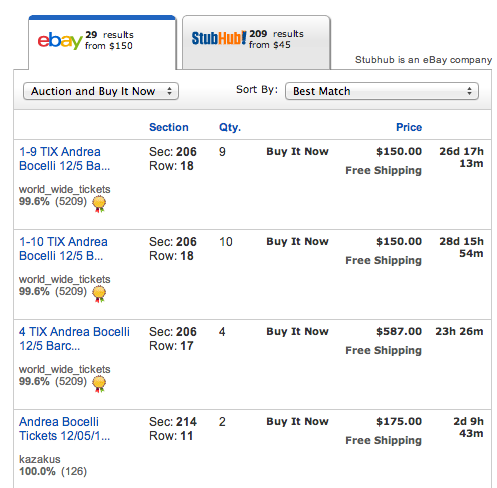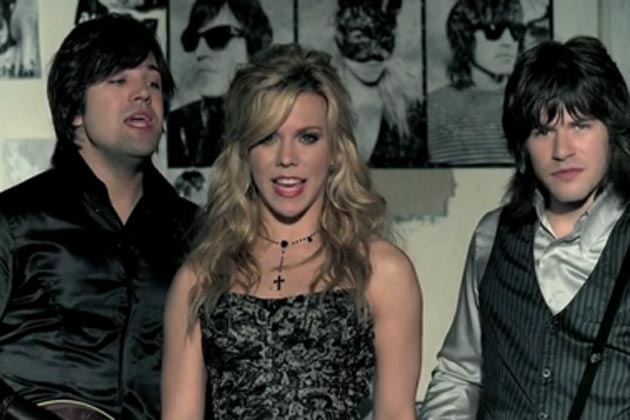This summer we wrote about the inefficiency of the live event ticket market. The primary sellers – TicketMaster and their ilk – have attempted to maximize profits by not only tacking on dubious charges and fees, but selling tickets as much as 10 months in advance of the show date. That gives said ticket distributors a chance to enjoy your money even earlier. A bird in the hand, etc.
We can’t emphasize this enough, which is why it warrants a 2nd post – buy your tickets as late as possible. (See? We can be repetitive, too! All the greats do it.) You people who claim “I like to collect experiences, not things”, whatever that means, especially should take heed here.
Like that of a lot of goods in the last decade, the market for tickets has changed drastically. The original problem was that it was a pure monopoly, or at least had most of the characteristics of one. You bought your tickets from TicketMaster, or whomever, or you missed out and panicked on the day of the event, which involved going to a scalper at the venue. And for anyone who’s ever done it, buying from a scalper feels slightly less seedy than patronizing a pot dealer or a veiny prostitute.
You don’t have to do this anymore. There’s a better way. As business author and envelope maven Harvey Mackay puts it, “There’s no such thing as a sold-out house.” Here’s how you get tickets for that basketball game/Lady Gaga concert/flea circus without tying up your money unnecessarily.
Wait until the last minute. Not literally the last minute, but close enough. Tickets go on sale this week for a concert that doesn’t take place until April? Major League Baseball released its schedule and you plan to see the Diamondbacks play the Dodgers in the final homestand of the season? Relax. Have a soda. Go for a walk. Fly to Argentina, marvel at the Andes for a few weeks.
Then, 3 (or better yet 2, but it’s hard to get there without practice) days out, hit
- StubHub
- eBay
- The underrated superstar here, Craigslist.
You know how you can lose all sense of discretion when you’re enthralled by a live event, playing air drums along with Neil Peart or cheering a football team onto victory against a division rival? There it is again, that cursed right brain getting in the way and ruining our lunch. Cutting loose during an event is fine, even encouraged, but you still have to be icy and logical during the process of buying your ticket. OMG RAVENS-STEELERS GOTTA BE ON THE 50-YARD LINE NO MATTER WHAT NO MATTER WHAT I SAY is no way to commit what could be a few hundred dollars to what’s only going to last 3 hours or so, tailgating excluded.
Slow down and remember – you’re buying something extremely perishable. Getting excited about buying a car, and risking overpayment because you’re afraid it’ll be gone tomorrow, is dumb. But behaving the same way regarding an event is even stupider because…
On balance, it’s almost always a buyer’s market. Unlike the tickets in the seller’s possession, the cash in your pocket will still be worth something tomorrow. Use that leverage.
But I have to see Chris Brown! It’s the last show of the tour, and he might be in prison a year from now.
Again, slow down. You don’t “have” to see anything. And they’ll play the Super Bowl next year, too. They always do. It’s fun to think that your life becomes more meaningful if you inconvenience yourself to see a concert or a game that you think holds special meaning. Maybe it even does. But if it does, that doesn’t mean you should overpay for the privilege.
If you’ve never used StubHub, it’s straightforward. And credible, after eBay bought it and made it a wholly owned subsidiary. eBay still maintains its own ticket marketplace for some reason, and lets you see availability and prices on both sites side-by-side:
So that gives you a starting point. Another thing to remember, and this is critical:
Asking prices mean nothing.
This is a corollary to it being a buyer’s market. A seller wants $900 for a pair of tickets with an official price of $100? Good for her. She can offer them at $30,000 if she wants, it doesn’t matter. Maybe some sellers do this in the hopes that some maldextrous buyer will accidentally press the “Buy” button and create the easiest windfall ever.
(Side note: The media attention surrounding the recent “hyperinflated” prices for Twinkies on eBay. A local newspaper reporter in CYC’s hometown claimed that Twinkies were selling for $250 apiece. They weren’t being sold at that price, they were being offered at that price. You need to look at the actual auction closing prices, which were more in the neighborhood of $2.50 per, to gain any useful information here. The exaggeration was 100-fold, but isn’t that what journalism is largely about?)
Watch one eBay ticket auction, participate if you must. Once it closes, you have the knowledge that turns the buyer’s advantage into an overwhelming one. You’ll know the crucial second half of the equation, and thus where supply and demand intersect. This places the sellers at an even bigger disadvantage.
Here’s a real-life example. We wanted to see Rush play our hometown a few weeks back. And if we were going to go, we wanted to be on the floor. The sticker price for floor seats? $154 each.
By the way, we didn’t get financially independent by making it a habit of dropping $308 for a few hours’ entertainment. Instead we hit a couple of eBay auctions, 2 and 1 nights before the show. Each time we were outbid in the final seconds, which told us a couple of things:
- There’s some sort of demand for tickets. It’s not as if we could just swoop in and lowball on an item that no one else wanted.
- Floor tickets were selling for about 10% below cost. Which meant they’d be getting cheaper, not more expensive, as showtime approached.
We were legitimately hoping to win the 2nd auction, but that’s the point. Don’t overpay, which means don’t overbid. We set a maximum bid before we started, and didn’t raise it, no matter how tempting doing so sounded as the clock ticked down to 0.
Then we headed to Craigslist, where buyers aren’t protected as well as eBay buyers are. You might get scammed on Craigslist, but most of the people who do are idiots and are practically pleading to be taken advantage of.
Go to NameOfYourCity.craigslist.org/tix. You can select tickets sold by owners, sold by brokers, or both.
You want tickets sold by owners. It that isn’t obvious, there are several reasons:
- An individual owner has more incentive to sell his tickets than a broker’s employee does.
- The former is easier to negotiate with, and probably easier to research (again, covering yourself when dealing with unknown players is critical.)
There were maybe 25 sellers hawking tickets on Craigslist. We eliminated anyone who didn’t advertise what section their tickets were in. (Why are they wasting our time, and why would they waste theirs?)
That left maybe 12, all of whom we sent the same email to. “Will you sell them for (10% below cost)?” (Unless some of the sellers had been already offering them for even less, in which case we’d offer something still less than that. But no one was offering them for so little.)
A few didn’t respond, a few said their tickets were already gone, and one liar claimed that if he didn’t get his asking price, he’d just eat the tickets. That left one guy, who said that we could name our price. Why? Because he was thousands of miles away, and had physical tickets in hand.
We improvised. We suggested he call the venue’s ticket office, explain that he couldn’t go to the show and wanted to transfer ownership to someone local, and plead his case.
And damned if the venue didn’t say yes. Even better, the poor guy had bought 4 tickets – twice as many as we needed. They emailed him a PDF of all 4, he forwarded it to us, and said “enjoy the show”. Your mileage may vary – of course, you can’t assume that you’ll find that one person in a thousand who’s willing to give away $616 worth of tickets that he’d already written off.
Did we sell the remaining pair (for something around 10% below cost) and pocket it, essentially getting paid $277 to go to a concert?
Did we sell the remaining pair and give the proceeds to the original owner?
Yes, maybe, no, that’s not the point. The point is that we never would have been in such a position had we repeatedly hit “Refresh” on TicketMaster.com on the day sales opened, until we could finally purchase a pair. Again, let other people be the profit centers – not you.





